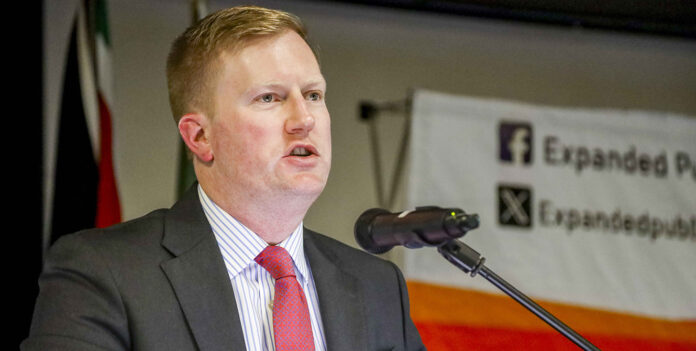Minister of Public Works and Infrastructure Dean Macpherson has announced new measures to clean up South Africa’s troubled construction sector.
Speaking at a media briefing at the GCIS Imbizo Centre in Cape Town on Wednesday, Macpherson warned that non-performing contractors will no longer be allowed to secure government contracts.
He said this while launching the South African Construction Action Plan (SACAP). The plan is a detailed framework aimed at rebuilding delivery, accountability, and public trust in government-run construction projects.
“From today, those who cannot or will not deliver will be held accountable, whether they are contractors, consultants, or officials,” said Macpherson.
The department currently manages R14-billion worth of projects under design, planning, and construction.
Among these is the 85 Anderson Street redevelopment in Johannesburg, a R707-million project already 64% complete.
The site employs more than 210 workers, supports 22 small businesses, and trains over 100 young people through the Expanded Public Works Programme.
He explained that the first action is based on accountability and contractor blocklisting, adding that he plans to end the cycle of failed contractors resurfacing under new names.
As such, restriction committees will be set up across all national and provincial departments to work with the Construction Industry Development Board in identifying and blocklisting defaulting contractors.
No second chances
Government departments will be required to submit lists of underperforming companies to prevent repeat offenders from receiving new tenders.
“If you have failed the state once, you will not be given a second chance to waste public funds.
“In addition, all departments will enforce catch-up plans for stalled or delayed projects, with progress reports submitted quarterly to MinMec.
“This is not about punishment for its own sake; it’s about restoring integrity,” according to Macpherson.
The second action zooms into fixing cash flow constraints, as it is emphasised that this remains one of the biggest reasons for project delays.
To address this, he said, project budgets will be ring-fenced and protected from diversion.
A new joint national-provincial subcommittee will monitor payments, report quarterly to MinMec, and intervene when funds are delayed.
MinMec is a forum that brings together national ministers and provincial MECs for the same portfolio to discuss policy, align strategies, and oversee intergovernmental relations
The third move is to ensure effective digital infrastructure tracking. He said all public works departments will adopt a digitised asset information management system to track projects in real time by March 2026.
This digital dashboard will monitor contractors, budgets, and progress across the country, providing transparency to both the government and the public.
In terms of procurement reform, in the fourth action plan, each department will establish a procurement war room to serve as a coordination hub aimed at bringing together supply chain experts, engineers, legal advisors, and project managers to accelerate tender processes.
“These war rooms will ensure projects move from bid to site without delay,” said Macpherson.
Audit issues acknowledged
SACAP’s digital system will track high-value tenders to ensure transparency and prevent unnecessary delays.
Macpherson acknowledged longstanding audit issues such as irregular expenditure and poor financial control.
As action five, he highlighted strengthening audit and governance outcomes.
Under SACAP, departments will now work directly with the auditor-general to resolve audit findings in real time. New financial controls will be enforced to ensure full accountability for every rand spent.
The final action focuses on building skills and integrity within the public sector.
By June 2026, all engineers, architects, and project managers employed by the Department of Public Works will be required to register with their professional councils, such as the Engineering Council of South Africa or the South African Council for the Project and Construction Management Professions.
A new professionalisation programme will be introduced with the Council for the Built Environment and the National School of Government to strengthen ethics and reduce reliance on consultants.
Although Macpherson acknowledged the public’s disappointment with the department’s performance in recent years, he asserted that the SACAP represents a significant milestone.
“We’re not sugar-coating the issues; we’re saying the system has failed too often, but it can and will be fixed.”



